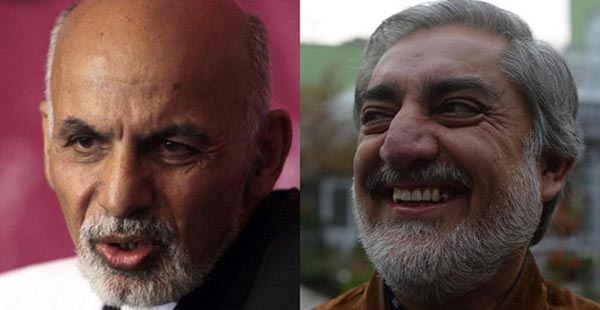Only few weeks have remained to the second round of election when the destiny of one of the most historic elections in terms of its critical period will be decided. The two frontrunner Presidential candidates have stepped forward to measure their popularity among people. Each of them has claimed that if the election is held in free and fair manner, he would be the winner. None has given the minor possibility of defeat.
Meanwhile it appears that the second of election would be much more interesting as well as vital. To some extent it was foreseeable in the first round that none of the candidates might get 50+1 in order to qualify to replace President Hamid Karzai. But such an issue does not exist anymore. One of the two will certainly become the president of Afghanistan. The question who will be that lucky candidate still has remained vague. Nobody can claim with certainty that who will become the next president. Both sides have their strengths and weaknesses. Meanwhile either side cannot count really on the traditional vote banks. However, ethnicity and language still plays an important role but people have started trans-ethnic and language voting which can be a major achievement of past decade.
Candidates gained vote from the areas they least expected and vice versa got less votes from the areas they had the highest expectation. Such a trans-ethnic vote is increasingly finding space among people. The sincerity of politician has far become important than communal relation.
In addition, in the first round of Presidential election, Dr. Ashraf Ghani Ahmadzai chose two of his deputies from Hazara and Uzbek community. Seemingly, for doing so, he came under harsh criticisms from the community members for being biased against Tajik ethnicity. Because after the topple of US-led military intervention, the three top political positions, Mr. President and two of his two vice-presidents used to come from two major other ethnic groups---Tajik and Hazara. So, this political structure, someone from Pashtun as President, first vice President from Tajik and second vice-president from Hazara community has been working as ensuring factor for political stability. Someone was arguing that some political leaders of Pashtun were tired of win-win game of Tajik leaders. As per rule unwritten political practice appeared after 2001, the seat of first vice president has been reserved for the second largest community in the country however it should be mentioned that no accurate statistics available about the population and the percentage of each community; everything related to population is just a guess nothing at all.
Anyhow, in the two previous presidential elections, 2004 and 2009, Dr. Abdullah Abdullah nominated himself against Hamid Karzai, the current president, though his first vice-president in both terms was from the same community.
No doubt, the presidential candidates try their best to select deputies who are influential and can attract votes of the particular community he/she belongs. As the way the presidential election candidates chose their deputies from among different ethnic clearly reflects the communal structure of politics.
In the presidential elections of 2004 and 2009, Mr. President Karzai chose his first vice president from Tajik community and second deputy from Hazara community. This communal trigonometry politics somehow ensured the political stability, as none of the three major communities felt that they were systematically marginalized. Meanwhile in both elections, Dr. Abdullah surpassed his competitors in Tajik-dominated provinces. In other words, the community voted in the favor of Dr. Abdullah irrespective of who was chosen as deputy to other candidates, including President Karzai. As a result, some thought that Tajik leaders are playing a win-win game. On one hand, the seat of first vice President is deemed as a reserved one for the community and at the same time launch tough political combat for presidential seat.
Seemingly, in 5th Presidential election, some candidates tried to change this communal trigonometry politics as Dr. Ashraff Ghani Ahmadzai did. Similar to rest of candidates, he chose individuals who can buy him votes. He chose General Abdul Rashid Dostum, the indisputable leader of Uzbek community and chief of Jonbesh political party. Such a move to some extent dealt blow to political tradition appeared in post-2001 process. By nomination of General Dostum for the position of the second top political position reflected the reality that some candidates may not play with old political curriculum. Though his move sparked criticisms and some blamed him of being biased against a particular community.
But the second round of the election is getting interesting. As seen in the first round of the election, part of the people started a trans-ethnic and language voting. Now both candidates are looking for voters of the other community. Dr. Ashraff Ghani succeeded to convince the Ahmadzia Masoud, the brother of Ahmad Shah Masoud, the former indisputable leader of Tajik community, to join hands with his team. He promised to appoint him as chief executive if he becomes the next president of Afghanistan, the post which he said would be created with modification of constitution.
Similarly, Dr. Abdullah convinced highly influential figures from Pashtun community to join his team such Zalmai Rasoul, two brothers of Mr. President, Gulagha Sherzai. Thus, the second round of the election would be much interesting. Both teams will get votes partially from the opposite community which on one hand give a national prestige for the winner and on the other hand will strengthen the pillars of democracy through changing traditional ethnic-oriented voting into interests-oriented voting.

